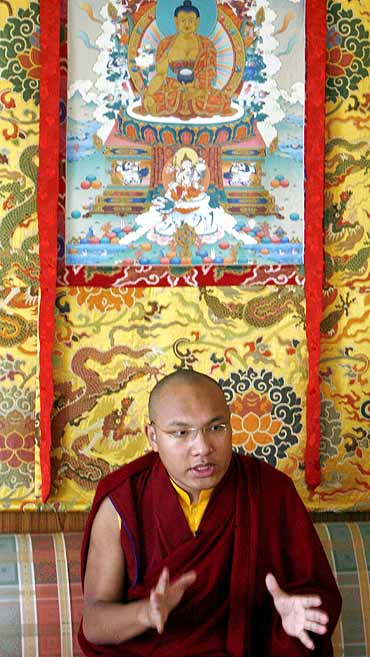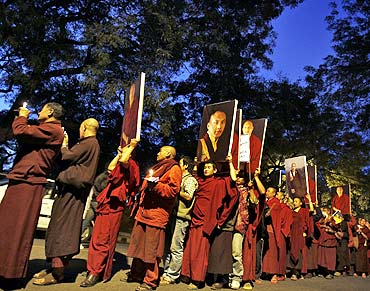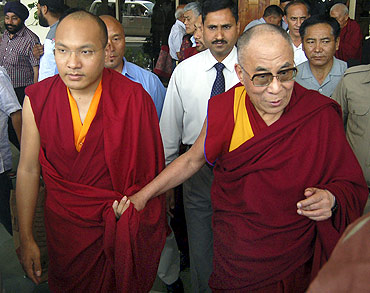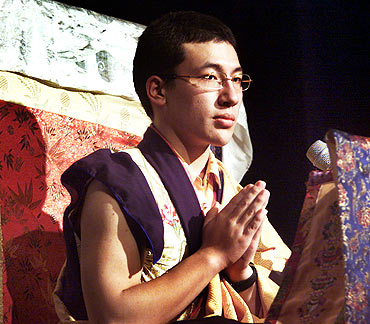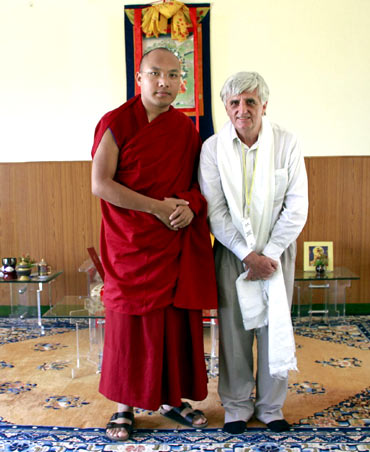 | « Back to article | Print this article |
'When Tibetans think of a place of refuge, they think of India'
On Wednesday the Himachal Pradesh police filed a chargesheet naming the 17th Karmapa, Ogyen Thinley Dorje, among 10 people in the case over the discovery of foreign currency worth Rs 7 crore at the Gyuto monastery. In June this year, the Karmapa Lama gave an exclusive and rare interview, to rediff.com. We reproduce it below:
While approaching the Gyuto Ramoche monastery in Sidhbari near Dharamsala in Himachal Pradesh, one is immediately struck by the pervading peace of the complex. Since 2000, the Gyuto or Upper Tantric College, has offered as temporary accommodation, a wing of its premises, to the 17th Karmapa Lama, Ugyen Thinley Dorje, who has been in the news in recent months.
The 26-year old Lama lives here, surrounded by relatively tight security, with the majestic Dhauladhar range as a background.
Till now, apart from a few statements issued by his office, the young Lama has refused to come out of his reserve and comment on the accusations levelled against him, particularly the cash donations received by his monastery but not deposited in a bank, and his relations with India.
For the first time, he agrees to speak to Rediff.com in an exclusive interview to Claude Arpi, who also interviewed the newly elected prime minister of Tibet, Lobsang Sangay, in Dharmsala.
Throughout the interview, one discovers a remarkable calm young man, deeply interested in Indian culture, in art and the environment of the Himalayas, who is able to see the deeper meaning of the controversies that have surrounded him since he fled from Tibet in 1999, under amazing circumstances.
He takes time to answer each question, knowing perfectly the importance of his words. He usually prefers to speak through his interpreter, except for the last questions where he showed his proficiency in English and his sense of humour.
Your Holiness, can you tell us about your relations with India, which is often misunderstood?
My relationship to India is not something limited to the life of a single individual. This important relationship between the Karmapa lineage and India has a long history that goes back 900 years.
This relationship cannot be separated from this context. The Buddhist lineage was introduced more than 1,200 years ago in Tibet. The beginning of my own [Karmapa] lineage started 900 years ago, and its traditions are firmly rooted in India. The entire history of our lineage goes back to India. The lineage transmitted by the Karmapa comes from India, and was passed through the great Indian Mahasiddha Tilopa and Mahapandita Naropa, whom we revere as our forefathers in this Dharma lineage. Without these Indian sages as predecessors, the history of the Karmapas lineage would have not come into existence. Thus the Karmapa lineage itself is rooted deeply in the very soil of India.
Continuing with this historical background, at the end of the 1950s, when Tibet went through a critical period, Tibetans turned to India. Not only did they turn to India, but India responded warmly and since then has truly been a generous host for the Tibetan people -- not only for His Holiness the Dalai Lama but also for the many tens of thousands who took refuge [in India] and who now form the Tibetan diaspora. India has been a great host; India extended her hospitality to the displaced Tibetan people, for whom that hospitality was not a mere formality, but a matter of life or death.
On top of this, India has provided a sanctuary for the preservation of our Buddhist religious and cultural heritage as well as our Tibetan culture in general.
When the times were so difficult, when we were in such an utterly helpless situation, to whom did we turn? To India! And India provided the refuge we so desperately needed.
Even someone like me, born after 1959, I have heard so much about the kindness and generosity of the Indian people after 1959. It is much talked about among Tibetans. In my generation, there is a general attitude of gratitude towards India to the extent that when Tibetans think of a place for refuge, a land of peace and freedom, where the meaning and purpose of our life can be fulfilled, we immediately think of India. This is why the Tibetan people, myself included, have eagerly turned to India for refuge. We have the feeling that just by reaching the holy land of India, we have accomplished something of great meaning in our lives.
Your Holiness has taken the initiative to look for some religious songs in Sanskrit (they were lost in their original forms in India). Could returning to India these parts of the Indian cultural and religious heritage, be considered as your offering to your host country?
As I mentioned, India is the source of Buddhism for the world. Buddhism originated in India, but it was unfortunately virtually destroyed in its homeland. As heirs to the Buddhist teachings from India, we feel a family connection. We think of ourselves as descendants of India. As descendants of this Buddhist inheritance, we feel responsible for preserving it. In fact, not only must we preserve it, but also whatever spread to our culture and language and is now preserved in it, I feel that we must try to offer back to India. That means we have a family obligation to bring the Dharma back home to India. We have accepted this responsibility to contribute to its revival and renaissance in India.
In this context, I have taken some initiatives. For instance, whenever we have prayer gatherings for world peace, such as the one we hold annually in Bodh Gaya the Kagyu Monlam Chenmo -- at the beginning of the function, when the Sangha [community of monks and nuns] gather together, we chant prayers in their original Sanskrit. Reviving the use of Sanskrit in our prayer gatherings is one way to acknowledge our heritage and to recollect enduring India's kindness to us.
We also have some wonderful sacred songs, also known as Dohas or songs of realisation with very profound words.
Were there Sanskrit songs?
No, they were in different ancient Indian languages. We can't single out Sanskrit; these Dohas existed in different ancient languages of India, Sanskrit is of course the best known of these languages.
These wonderful Dohas that were once sung in India are now lost here. They are virtually unknown within Indian society. I thought it was important to revive them [by having them performed again] in their ancient form. I feel that it is our responsibility to preserve them and make them available to the Indian public. We have treasured these sacred Dohas for many centuries in Tibet. India is now the second home to us Tibetans, and this is just one small effort to try to bring back home to India what India generously offered to us Tibetans many centuries ago.'If there is any doubt or suspicion about me, I am ready to clarify'
Oh yes, I like Indian food.
Do you like cricket?
Cricket is not played in every country of the world. For example, when I lived in Tibet, I never heard about this game. Frankly, even now, I do not fully understand cricket! But when you live in India, how can you not be influenced by it? Cricket is one of the most important or prevalent games in India -- some might even call it one of the 'religions' of India -- so one way or another, one gets influenced by the game.
Since the time you arrived in India, some Indian officials raised some doubts about you. What can be done or what can you do to dissipate the doubts?
Recently, I have personally approached and communicated directly with some prominent Indian leaders and have also communicated indirectly through some of my representatives. [A delegation of eminent Indian disciples of Karmapa met Prime Minister Dr Manmohan Singh, Congress President Sonia Gandhi and other senior leaders in Delhi].
Your Holiness has personally met Indian leaders?
Yes, some senior officials. I would like to say that if people in the government or people in positions of responsibility have any doubts or suspicions about me, I hope that they might ask me. Please ask me!
You will clarify if there is any doubt.
Yes, I am ready and willing to do whatever is needed to clarify any doubts anyone may have. In fact, I am eager to have the opportunity to answer questions, because allowing such doubts to linger is not helpful for anybody, neither for me of course, but nor for the Indian government. Therefore the best is, if there is still any doubt or suspicion, I would welcome the chance to answer them directly.
You are ready at any time to clarify?
Yes, I will clarify.
Any restriction from the Government of India on your tours in India?
According to the information made available to me, I am restricted from visiting Sikkim [where there is a court injunction] and the monastery of Sherabling [in Himachal Pradesh, the seat of Situ Rinpoche who recognised the present Karmapa]. But I can visit all other places in India, though of course I must seek permission to travel anywhere.
Does His Holiness the Dalai Lama follow the same procedure when he informs the liaison office of the ministry of external affairs of his intended trips?
It is not exactly the same. In the case of His Holiness the Dalai Lama, it is a matter of formality. He just has to inform of his intention he wants to go tomorrow to such and such places; in my case, it is a bit different. I have to apply through various channels, well in advance, and then wait for the clearance.
Have the issues that made the headlines in the Indian press a couple of months ago, been sorted out, mainly the issues cash donations/offerings and benami purchase of land?
It is better if you ask the general secretary of the trust. He knows better the details of these things.
[General Secretary Karma Chungyalpa says that, as a measure to bring its house in order, the Karmapa Office of Administration has engaged an Indian chartered accountant. Approval under the Foreign Contribution Regulation Act to accept donations in foreign currency is still under consideration by the ministry of home affairs. A delegation that met Home Minister P Chidambaram and Home Secretary G K Pillai was assured that the application was being processed. Regarding the purchase of land on which to construct a permanent home for His Holiness the Karmapa, necessary applications had been made to the relevant government departments, including the local town planning authorities of the Himachal government, well before the issue made the headlines of the Indian press. This request is still being processed.]'It is not justified to compare me with His Holiness the Dalai Lama'
Of course, I have no direct contact with Tsurphu monastery. But sometimes when people are able to come from there, I am able to hear some news second-hand from them.
Do you have many Chinese disciples from mainland and Taiwan?
Yes, they come here [to Himachal] or to Bodh Gaya [in winter].
Apparently, the Chinese government never criticises you, is it true?
I am not sure that it is correct. Criticism need not to be always public [in the press]. For example, I heard that some time back it was forbidden to display my picture in monasteries in Tibet.
In Tsurphu?
No, in other monasteries, not in Tsurphu.
My point is that criticism is sometimes not made public. Just because the Chinese government does not single someone out for public criticism, can this justify accusing this person of being a Chinese spy? I think that it is ridiculous.
It is equally ridiculous to equate anybody with His Holiness the Dalai Lama. He is the unquestionable temporal and religious leader of the Tibetan people. He is the symbol of the Tibetan cause; he is its supreme torchbearer. It is not justified to compare me with His Holiness the Dalai Lama. Obviously, the Dalai Lama is specifically targeted for criticism by the Chinese government because he has this prominent leadership role and he leads the cause so very well.
It would be very naive to believe that there is something suspect about me, simply because the Chinese government does not criticise me. They are more clever than that. If they calculate that it is in their interest to criticise somebody publicly, they will criticise them. If it better serves their interests not to criticise them openly, they will not do so openly.
Furthermore, we have different traditions in Tibetan Buddhism and there are leaders for each of these different traditions. The leaders of these traditions are not criticised by the Chinese government either. Why? Because they have no political role, just like me. Why should it be normal that other religious leaders are not criticised, while not criticising me is wrong?
You said the Dalai Lama is the Light of Tibet. He has now announced his political retirement, will he remain the Light of Tibet?
Yes, His Holiness the Dalai Lama has made clear that he is devolving all his political and administrative responsibilities, but this does not diminish the spiritual authority of the Dalai Lama. It does not and cannot diminish the deep faith and respect that the Tibetan people place in him. This will not change. His authority in that sense will remain unquestionable.'Meeting with Thaye Dorje is not an issue, but what is the purpose?'
To make it very simple, meeting him is not a problem. Of course we can meet. I have even met with Shamar Rinpoche, so a meeting with Thaye Dorje is not an issue. But what would be the purpose and the result? It is unclear whether it would have a positive outcome. The result of such meeting might be positive or might not.
Further, Thaye Dorje is only the person in front. One needs to ask, who is behind him? For this reason, just meeting him personally is not the answer; in fact it could create more rumours or confusion, with no substantial result at the end. It is not that easy. Thaye Dorjee would have other people advising him as to whether we should meet. I too would take others' views into consideration as to the wisdom of such a meeting.
In the end, it is not simply meeting that matters. What matters is what would be the immediate and longer term benefits of such meeting. That it is the big question.
Someone in your monastery of Rumtek in Sikkim told me that the dispute with Shamar Rinpoche (and Thagye Dorjee) is a 'karmic' issue; a time factor is involved and therefore it may take some time to be solved. Would you like to comment?
You can try to reason it through in such way, but this issue is difficult to reason through. In fact, it is inconceivable for this to have happened. For those who know the history of the Shamar Rinpoche reincarnation lineage and the long history of the Karmapa reincarnation lineage, it seems simply impossible that a situation like this could occur. It is utterly unprecedented in the Karma Kagyu lineage. There was nothing indicating that something like this could happen. As far as the sanctity and integrity of the Karmapa lineage is concerned, it is impossible. Yet it has happened.
From this point of view, one could say that it is a karmic situation. In all fairness, it can't be blamed on one side or one situation exclusively. This could be opened for discussion, but I do not think all the fault lies entirely on one side. By this, I mean that if all people involved had proceeded with integrity, in accordance with the truth of karma, if they had remained harmonious in their vision, this would not have happened. But it has not been so, and thus this has happened.
As far as solving the issue, it cannot be solved as a technical problem by employing some [outer] techniques. The solution must come from "taming of the mind" or proper training of the mind. If one has the ability, one should recall the integrity of our predecessors, the highest standard of their spiritual ethics, and the spiritual vision that they have set for us. To recall this and bring it back into ourselves [His Holiness shows the gesture to bring down the wisdom of the lineage] is the solution. We have to reinstate this integrity [of the lineage] in our minds.
Yes. It cannot be solved technically. Ultimately, only spiritual transformation will work.'To be too serious in life is not good'
If you are interested, you can ask our office about the details [Some of these activities are listed on the Khoryug website]. They will tell you about our ongoing projects and what has been accomplished, for example in terms of vegetarianism, and other issues related to environment.
The only thing that I would like to say is that the issue of environment is beyond religion, beyond politics. It is a critical, fundamental issue for our very existence; the existence of all the species of this one Earth. Because of the current state of the eco-system and the interdependent existence of this system, the Himalayan belt and Tibet play an important role in this region of the world as well as the world in general.
It would be unfortunate and destructive to view this issue only from a political, economic or material angle. For example, when one talks about 'Tibet' and its connection with the neighbouring Asian, people immediately associate it with politics. Why? We are talking here of fundamental issues that are critical for our human existence together on this planet. Why mix it with politics [just because of the word 'Tibet']? This is most unfortunate. The challenges are very daunting, but it is a very important task.
I am told that you a good painter and poet. Is it true?
No, no!
Is it an exercise or a religious practice?
It is my own exercise (laughing). I am not so good at religious practices, but painting and poetry are part of my personal training, part of my personal growth.
I observed you during a long function in honour of the outgoing Tibetan prime minister, Prof Samdhong Rinpoche (the Karmapa was the chief guest); you looked very serious and reserved. But when you addressed the gathering of Tibetan ministers and MPs, you made everyone laugh. You have a great sense of humour.
What place do you give to humour in life?
The previous speakers all spoke in a serious manner, about serious matters; then my turn came to speak. What I wanted to say had been already been said, so there was nothing much left for me to say. I had to make some jokes (laughing).
The Translator: His Holiness said very beautiful things
(Cutting him in English) No, no, no. But humour is important in life. To be too serious in life is not good. It can make life seem miserable.
Thank you very much, Your Holiness.